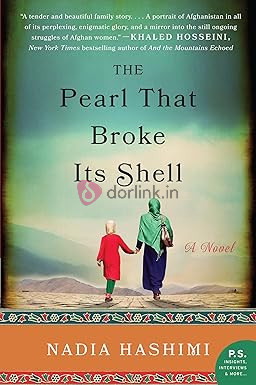Writer : Nadia Hashimi
- Shipping Time : 10 Days
- Policy : Return/Cancellation?
You can return physically damaged products or wrong items delivered within 24 hours with photo/video proof.
Contact Customer Support for return initiation and receive return authorization via email. Securely package for return.
Refunds for eligible returns are processed within 7-10 business days via Bank Transfer.
Order cancellation allowed within 24 hours of placing it. Standard policy not applicable for undamaged/wrong product cases. Detailed info. - Genre : Literature>Short Story & Micro/Flash Stories
- Publication Year : 2014
- ISBN No : NA
- Binding : Paper Back
- Pages : 469
- Weight : 499 gms
- Height x Width x Depth : 8.5x5.5x0.5 Inch
If so, it will be notified
About the Book
The Pearl That Broke Its Shell: A Legacy of Survival, Strength, and Defiance
"If fate is a storm, then a woman must learn to be the wind."
In 2007 Kabul, Rahima is born into a world that cages its daughters. With a father lost to opium and no brothers to safeguard their futures, she and her sisters are left powerless. But there is one way out—bacha posh, the ancient tradition that allows a girl to live as a boy, if only for a while. As Rahima sheds her veil and takes on a new name, she tastes the intoxicating freedom of a life denied to her. But what happens when the illusion shatters, when she is forced back into the confines of womanhood, where obedience is law and marriage a sentence?
A century earlier, her great-great-grandmother, Shekiba, fights for her own survival in a ruthless world. Orphaned by an epidemic, cast aside by a society that deems her unworthy, Shekiba carves her own path—one that mirrors Rahima’s in ways neither of them could ever have foreseen.
Interweaving past and present, The Pearl That Broke Its Shell is a spellbinding tale of resilience and defiance, of women who refuse to be bound by the roles carved out for them. Nadia Hashimi paints a world both breathtaking and brutal, where freedom is fleeting and courage is a quiet revolution.
Will Rahima's borrowed freedom prepare her for the battle ahead? Will Shekiba’s strength be enough to guide her descendant through the storms of fate? Some shells must break to reveal the pearl within—but at what cost?

